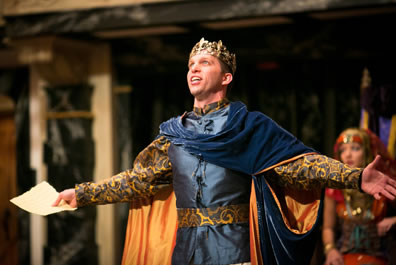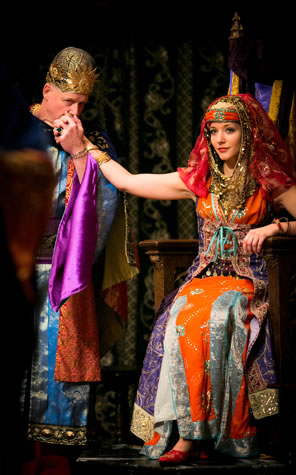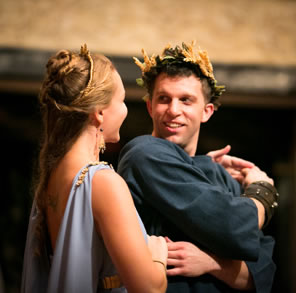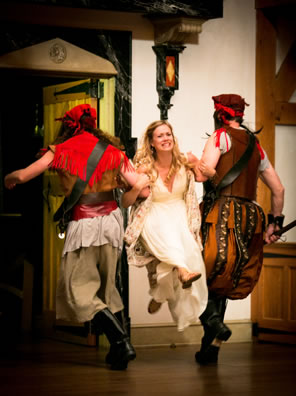Pericles, Prince of Tyre
Never Has a Play So Bad Been So Good
American Shakespeare Center, Blackfriars Playhouse, Staunton, Va.
Saturday, September 27, 2014, C–5&6 (front middle stalls)
Directed by Jim Warren

Pericles (Gregory Jon Phelps) figures out the riddle regarding the daughter of Antiochus (Sara Hymes, background) he has come to court in the American Shakespeare Center production of William Shakespeare's Pericles, Prince of Tyre at the Blackfriars Playhouse. Photo by Lindsey Walters, American Shakespeare Center.
This is one of William Shakespeare's most maligned plays. Yet, what makes the American Shakespeare Center's production of Pericles, Prince of Tyre so amazingly good is that it treats the full text seriously (yet, still, as a comedy) instead of relying on wink-wink visual humor to get us through the gawd-awful composition of the play's first half. They did dress it up with gorgeous costuming by Jenny McNee, but all that eye candy is filled with substantive drama and satiating comedy.
In fact, I'll go so far as to say that in a year in which the ASC has produced such favorite Shakespearean stalwarts as Macbeth, As You Like It, and The Comedy of Errors, only one other Shakespeare piece the company staged this year surpasses this Pericles in overall excellence: Timon of Athens, Shakespeare's other "most maligned" play. Whoa! Have I leaped over the extremes of Shakesgeekdom or what? No, because I'm a big maligner of both plays myself.
And really, both plays malign themselves. Timon is a collaboration in which a lesser writer mingles with the greater writer so that we get doses of both brilliance and huh? Pericles also is a collaboration, but it has a clear demarcation line. In its latter half, this play has comic scenes (the Mytilene brothel) as rich as any Shakespeare ever wrote, and two reunion scenes that can move you as much as Lear and Cordelia do. To get to these scenes, however, you, like Pericles himself, have to survive the troubled waters and shipwreck that make up the first two acts, the author of which scholars have identified as George Wilkins, a sometime pamphleteer and playwright—and I am using the terms troubled waters and shipwreck to describe the writing, not just the plot.
That plot seems to have been concocted by a demented 14-year-old. In fact, it was first written around 1400 as an epic poem by John Gower, and Gower himself (René Thornton Jr.) serves as the play's chorus, a narrator giving us back stories and filling in events between scenes. Pericles (Gregory Jon Phelps) travels to Antioch to win the daughter of King Antiochus by solving a riddle; failure to figure out the answer will result in losing his head (and we can see previous suitors' heads on the Antioch battlements in the upper stage). The riddle, that Antiochus (James Keegan) is having an incestuous relationship with his daughter (Sara Hymes), is laughably transparent. Pericles solves it (who couldn't?) but forestalls giving an answer and escapes. Antioch hires a murderer to pursue Pericles, so the prince of Tyre puts his closest advisor, Helicanus (Patrick Midgley), in charge of his government and heads to sea. He first saves Tarsus from famine with his ship full of corn, escapes the pursuing Antioch assassin yet again by heading back to sea, and is shipwrecked near the coast of Pentapolis. Shortly after he washes ashore, a trio of fishermen drag his armor ashore, and with that he goes to the court of King Simonides (Jonathan Holtzman) to participate in a tournament for the princess, Thaisa (Hymes again). Pericles wins the contest and banquets and dances with the other competing knights as Thaisa wishes he could be her meat (those are her words). Simonides, feigning anger toward the unknown knight, tricks Pericles into marrying his daughter.
Let's pause a moment here because, in fact, these scenes are more ridiculous than what I just described. Gower as chorus speaks in highly formalized—i.e., archaic—octosyllabic rhyming couplets while the rest of the play is in iambic pentameter blank verse and prose. The overlong speeches contain such awkwardly composed lines as "And should he doubt it, as no doubt he doth." The fishermen are as extreme in their gullibility as Antiochus is in his tyranny. The Pentapolis tournament starts with a parade of knights showing off their shields with mottos that Thaisa reads and translates—theater as gripping as VIP introductions at a Rotary banquet. Scenes are either amateurishly constructed or the text is corrupted, as when Pericles returns to Tyre from Antioch in the second scene. It opens with the stage direction "Enter Pericles with his Lords," whereupon Pericles says "Let none disturb us!" and, immediately, another stage direction follows: "Exeunt the Lords." That's more Monty Python than Shakespeare. And then, after a 33-line soliloquy, all the lords re-enter, unsummoned, to disturb Pericles. They do greet their prince innocently enough, but Helicanus rails on them for being flatterers (Whoa! chill, dude), and then he and Pericles get into a testy exchange over the prince's "angry brow."After threatening to kill Helicanus, Pericles suddenly seeks his advice and turns his government over to him. Okay.
How the production's director, ASC Artistic Director and Co-Founder Jim Warren, makes all this work is by sticking to the company's overriding principle of text-centric staging and employing a troupe of actors well-trained and experienced in speaking and acting not only Shakespeare's verse but those of his contemporaries, including his collaborators. Though Pericles has been surgically edited to smooth out the text's biggest bumps, more important is that the cast treats with zealous respect the verse that remains, using troublesome passages to dramatic effect and relying on their acting skills to gloze over silly plot points.
For example, though Helicanus describes himself as experienced, ASC cast Midgley rather than an older man in the role, making him a peer of Phelps's Pericles. The angry nonsense that passes between them becomes an inside joke between compadres, turning an uneven sequence into a fun building block that helps define these characters and their relationship. Phelps still must speak Pericles's line "And should he doubt it, as no doubt he doth," but he purposely stumbles over the line's alliteration, displaying a trait of self-doubt that stays with Pericles throughout the play.




Costume Designer Jenny McNee's depictions of ancient Mediterranean societies in the American Shakespeare Center's production of Pericles, Prince of Tyre at the Blackfriars Playhouse: from top, Antiochous (James Keegan) and his daughter (Sara Hymes) in Antioch; Thaisa (Hymes) and Pericles (Gregory Jon Phelps) in Pentapolis; pirates carry off Marina (Lauren Ballard) in Tarsus; Bolt (Keegan) and Bawd (Allison Glenzer) in Mytilene. Photos by Lindsey Walters, American Shakespeare Center.
The staging of the Antioch scene implies that the previous suitors might have also figured out the riddle but didn't have the mental alacrity Pericles had to extricate himself from immediate danger by making sure Antiochus knew he had solved the riddle (thus winning the contest) but refusing to speak the answer publicly. After Pericles is shipwrecked in Pentapolis, Midgley plays one of the fishermen as a jovial New York longshoreman, and what's silly gullibility on the page becomes on the Blackfriars Playhouse stage a representation of Pentapolis's general hospitality and happy tone established by its personable king, "good Simonides," as the fishermen call him. "He is a happy king, since he gains from his subjects the name of good government," says Pericles. This feeling flows into the tournament pageant. Though the knights from various anachronistic countries first appear in their parade as broodingly fierce (making a boring scene pretty darn funny), the post-tournament banquet evolves into a partying good time under Simonides's exuberant humor. It would be natural for Thaisa, daughter of such a Simonides, to be open in her infatuation with Pericles, and we can see her falling in love with him during their dance. Holtzman plays Simonides with such euphoric joy as he maneuvers his head-strong daughter and the bashful prince into marriage that he earns the production's first of many exit applauses.
Shakespeare, presumably, now takes over the story. Pericles and a pregnant Thaisa set sail for Tyre, but the ship encounters a storm just as Thaisa dies in childbirth. The sailors insist on dumping her body overboard to appease the gods, and they have a coffin for the purpose. She washes up on the shores of Ephesus where a mystical doctor, Cerimon (Chris Johnston), discovers she's not really dead, revives her, and sends her to serve as a nun in Diana's temple. The gods apparently appeased, Pericles's ship sails on to Tarsus where he leaves his newborn daughter, Marina, to be raised by King Cleon (John Harrell) and Queen Dionyza (Sarah Fallon). Fast-forward several years, Dionyza has grown jealous of how the teen-age Marina (Lauren Ballard) out-fames her own daughter and plots to have her killed (this though Marina's father saved her land from famine a few scenes earlier). Just as Leonine (Benjamin Reed) is about to kill Marina, a pack of pirates show up, whisk her off, and sell her into the brothel at Mytilene. However, Marina proves so pure she not only maintains her virginity, she also reforms the brothel's customers, one of whom is the Mytilene governor, Lysimachus (Reed again). The frustrated brothel owners try to reform her to their ways but end up making more money selling her skills in music and knitting to wealthy families. Meantime, Pericles goes to Tarsus to retrieve his daughter (some 16 years later? really?), learns that she passed away and goes into a deep depression, roaming the Mediterranean until, with full beard, he alights in Mytiline. By chance, he reunites with Marina and then learns in a vision that he and Marina need to visit Diana's temple in Ephesus (they bring along Lysimachus who now wants to marry the girl he's just learned is a princess). There, Thaisa reunites with her husband, meets her daughter, and wonders who the heck Helicanus is. Everybody good lives happily ever after: as for the bad, Helicanus has earlier described how Antiochus and his daughter were struck by lightening, literally causing a big stink, and Gower informs us that Cleon and Dionyza were burned in their palace by the citizens whom Pericles had saved.
OK, all that sounds as ridiculous as the first half of the play, but at least it is Shakespeare's writing, and he was writing this at the height of his creative powers: the characters are real, the scenes are cleverly constructed, the language is gorgeous. Remember, too, that Pericles likely led off the last phase of Shakespeare's career when he wrote his great, mystical romances; this play serves as a rough draft for Cymbeline, The Winter's Tale, and The Tempest.
Having made the bad parts good, the ASC cast now makes the good parts great with finely tuned performances. Ballard's Marina stares at her assassin in bewilderment trying to figure out why Dionyza would want her killed, as she had never caused any living being harm—well, except that one time: "I trod upon a worm against my will, but I wept for't." It's a sweetly comic line, but it's integral to how Ballard so believably wraps Marina's spiritual power in naive innocence and lays the foundation for the brothel scenes to come.
While the pirates are a slapstick hoot, with their arghs! and tussling over Marina like Nemo's seagulls, "Mine, mine, mine," the comedy turns more serious in Mytilene. Just the entrance of Midgley as Pander, Allison Glenzer as Bawd, and Keegan as Bolt the pimp inspires high anticipation among those of us who know both the play and these players, yet the payoff is even better than expected. As Bawd coaches her new charge in how to be a whore, the shocked Marina interjects: "Are you a woman?" "What would you have me be, an I not be a woman," Bawd says as Glenzer lasciviously molests Marina while yanking her hair. Glenzer in these scenes is both hilarious and dangerous: We laugh and cringe in alternation. Keegan is nothing but dangerous as his otherwise hilarious Bolt prepares to rape Marina, but he soon becomes baffled with his own inability to get past the sweet girl's implorations. "What would you have me do?" he says in exasperation, and when the pimp and virgin form a team—"Come," he says, "I'll do for thee what I can"—it earns a heartfelt "Awwww" from the audience.
Harrell and Fallon fill Cleon's and Dionyza's short scenes with human pathology as taut as that on display between the Macbeths. The difference is that Cleon, unlike Macbeth, defaults to goodness while Dionyza is a badder bad than Lady Macbeth (whom Fallon is playing in the season's repertoire). She doesn't inform her husband of the plot to kill Marina until it's concluded and the assassin, Leonine, also is murdered so that now only the two of them know what she has done (and she could easily cut two down to one). Yet, Fallon centers her deed in a mother's care, her murderous streak a linear evolution from the time she promised Pericles that she would not treat her own daughter as "more dear to my respect than yours, my lord." Dionyza would come to feel that Marina "stood between [her daughter] and her fortunes," and she tells Cleon, "Though you call my course unnatural, you not your child well loving, yet I find it greets me as an enterprise of kindness performed to your sole daughter." Under such persuasion, Harrell's Cleon agrees to go along with the cover-up, though he senses he may burn for it one day.
Shakespeare constructs the two reunion scenes to emphasize human psychology rather than melodrama. Pericles and Marina have fully identified each other long before they accept that they have done so, afraid that their sudden fortune is too good to be true. At Diana's temple, Thaisa faints when Pericles begins recounting his story, throwing Pericles into consternation for the unknown nun. "Noble sir, if you have told Diana's altar true, this is your wife," Cerimon says. "Reverend appearer, no. I threw her overboard with these very arms," Pericles replies, and Phelps doth say the line with an "oops" sheepishness. It's funny; it also indicates that he has, no doubt, carried with him all these years the guilt that he gave in too easily to the sailors' superstitions.
Ironically, the production's good-timing tone is actually set by that moldy old 14th century poet come back from the grave—and I don't mean as a zombie. The cast has barely finished singing "Beautiful City" from Godspell in the preshow when the stage trapdoor flings open with a loud bang and Thornton, dressed in Jacobean clothes (the fashion of Shakespeare's day, not Gower's), emerges. His Gower seems glad to be free from his coffin for a bit, and after he nods to the audience, he turns to see the line of heads stuck on the Antioch battlements. "Whoa!" Thornton says, before starting into his story. He may rhyme his lines, but this Gower is anything but static. He's an engaging storyteller, even growing a bit exasperated with how often he describes how Pericles sails out to sea yet again despite all the trouble it's bound to bring. Such is Thornton's performance, we almost don't need the visuals the other players provide.
Except that then we'd miss out on the production's brightest star, Costume Designer McNee. From country to country around the ancient Mediterranean, she dresses the residents in such bright colors it's as if their civilizations had just discovered all the dyes in Crayola's box of 64 colors. But it's not just the flash and dash of the clothes, it's the immaculate details in the fabric and accessories—crowns, belts, armguards, bracelets, head dresses, wheat wreaths, and eye patches—from the dingy rags of the starving Tarsus court to the cartoonish pirates who make just a fleeting appearance on the stage. So much effort put into a moment that lasts four short lines—the pirates come and go in what can't be more than 30 seconds—but thanks to the details in the costumes and in the actors' performances (though we don't have time to figure out who they are) we are left with a vivid memory.
And really, that's what you get with the whole of this two (and a half)–hour traffic on this stage and across the seas— from first (yes) to last. No more maligning this play.
Eric Minton
October 17, 2014
Comment: e-mail editorial@shakespeareances.com
Start a discussion in the Bardroom



 Find additional Shakespeareances
Find additional Shakespeareances